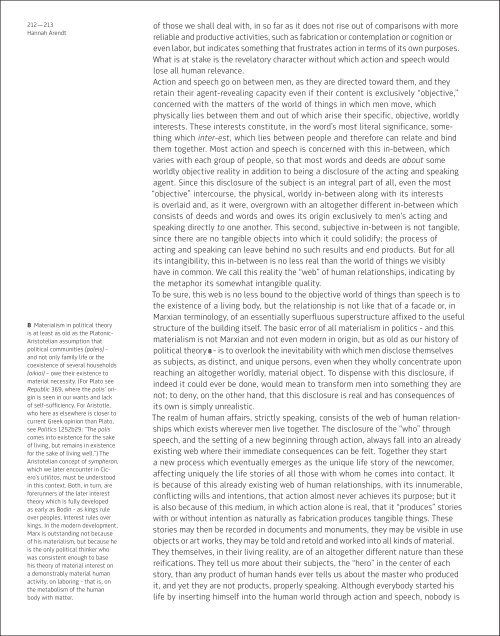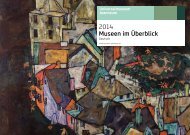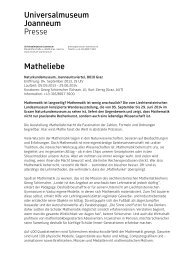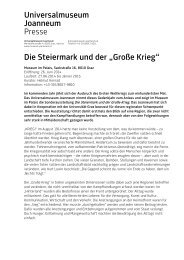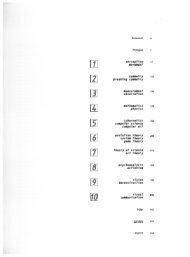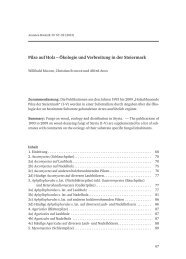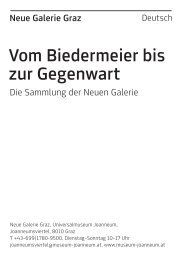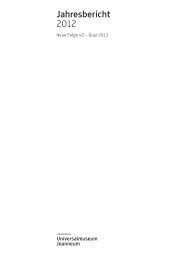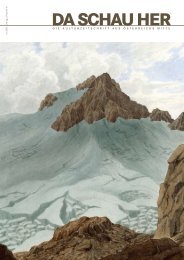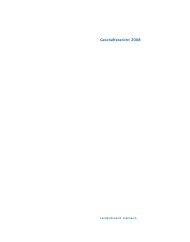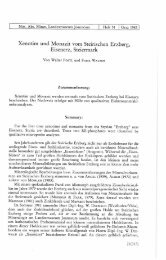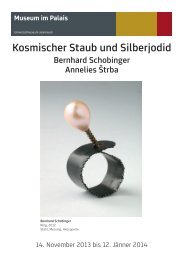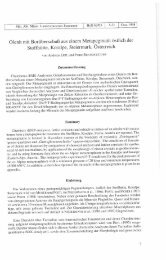Human Condition - Universalmuseum Joanneum
Human Condition - Universalmuseum Joanneum
Human Condition - Universalmuseum Joanneum
Erfolgreiche ePaper selbst erstellen
Machen Sie aus Ihren PDF Publikationen ein blätterbares Flipbook mit unserer einzigartigen Google optimierten e-Paper Software.
212 — 213<br />
Hannah Arendt<br />
8 Materialism in political theory<br />
is at least as old as the Platonic-<br />
Aristotelian assumption that<br />
political communities (poleis) -<br />
and not only family life or the<br />
coexistence of several households<br />
(oikiai) – owe their existence to<br />
material neces sity. (For Plato see<br />
Republic 369, where the polis’ origin<br />
is seen in our wants and lack<br />
of self-sufficiency. For Aristotle,<br />
who here as elsewhere is closer to<br />
current Greek opinion than Plato,<br />
see Politics 1252b29: “The polis<br />
comes into existence for the sake<br />
of living, but remains in existence<br />
for the sake of living well.”) The<br />
Aristotelian concept of sympheron,<br />
which we later encounter in Cicero’s<br />
utilitas, must be understood<br />
in this context. Both, in turn, are<br />
forerunners of the later interest<br />
theory which is fully developed<br />
as early as Bodin - as kings rule<br />
over peoples, Interest rules over<br />
kings. In the modern development,<br />
Marx is outstand ing not because<br />
of his materialism, but because he<br />
is the only political thinker who<br />
was consistent enough to base<br />
his theory of material interest on<br />
a demonstrably material human<br />
activity, on laboring - that is, on<br />
the metabolism of the human<br />
body with matter.<br />
of those we shall deal with, in so far as it does not rise out of comparisons with more<br />
reliable and productive activities, such as fabrication or contemplation or cognition or<br />
even labor, but indicates something that frustrates action in terms of its own purposes.<br />
What is at stake is the revela tory character without which action and speech would<br />
lose all human relevance.<br />
Action and speech go on between men, as they are directed toward them, and they<br />
retain their agent-revealing capacity even if their content is exclusively “objective,”<br />
concerned with the matters of the world of things in which men move, which<br />
physi cally lies between them and out of which arise their specific, ob jective, worldly<br />
interests. These interests constitute, in the word’s most literal significance, something<br />
which inter-est, which lies be tween people and therefore can relate and bind<br />
them together. Most action and speech is concerned with this in-between, which<br />
varies with each group of people, so that most words and deeds are about some<br />
worldly objective reality in addition to being a disclosure of the acting and speaking<br />
agent. Since this disclosure of the subject is an integral part of all, even the most<br />
“objective” intercourse, the physical, worldy in-between along with its interests<br />
is overlaid and, as it were, overgrown with an altogether dif ferent in-between which<br />
consists of deeds and words and owes its origin exclusively to men’s acting and<br />
speaking directly to one another. This second, subjective in-between is not tangible,<br />
since there are no tangible objects into which it could solidify; the process of<br />
acting and speaking can leave behind no such results and end products. But for all<br />
its intangibility, this in-between is no less real than the world of things we visibly<br />
have in common. We call this reality the “web” of human relationships, indicating by<br />
the metaphor its somewhat intangible quality.<br />
To be sure, this web is no less bound to the objective world of things than speech is to<br />
the existence of a living body, but the rela tionship is not like that of a facade or, in<br />
Marxian terminology, of an essentially superfluous superstructure affixed to the useful<br />
structure of the building itself. The basic error of all materialism in politics - and this<br />
materialism is not Marxian and not even modern in origin, but as old as our history of<br />
political theory 8 - is to overlook the inevitability with which men disclose them selves<br />
as subjects, as distinct, and unique persons, even when they wholly concentrate upon<br />
reaching an altogether worldly, material object. To dispense with this disclosure, if<br />
indeed it could ever be done, would mean to transform men into something they are<br />
not; to deny, on the other hand, that this disclosure is real and has consequences of<br />
its own is simply unrealistic.<br />
The realm of human affairs, strictly speaking, consists of the web of human reIationships<br />
which exists wherever men live to gether. The disclosure of the “who” through<br />
speech, and the setting of a new beginning through action, always fall into an already<br />
existing web where their immediate consequences can be felt. Together they start<br />
a new process which eventually emerges as the unique life story of the newcomer,<br />
affecting uniqueIy the life stories of all those with whom he comes into contact. It<br />
is because of this already existing web of human reIationships, with its innumerable,<br />
conflicting wills and intentions, that action al most never achieves its purpose; but it<br />
is also because of this medium, in which action alone is real, that it “produces” stories<br />
with or without intention as naturally as fabrication produces tangible things. These<br />
stories may then be recorded in documents and monuments, they may be visible in use<br />
objects or art works, they may be told and retold and worked into all kinds of material.<br />
They themseIves, in their living reality, are of an altogether dif ferent nature than these<br />
reifications. They tell us more about their subjects, the “hero” in the center of each<br />
story, than any product of human hands ever teIls us about the master who produced<br />
it, and yet they are not products, properly speaking. Although everybody started his<br />
life by inserting himself into the human world through action and speech, nobody is


